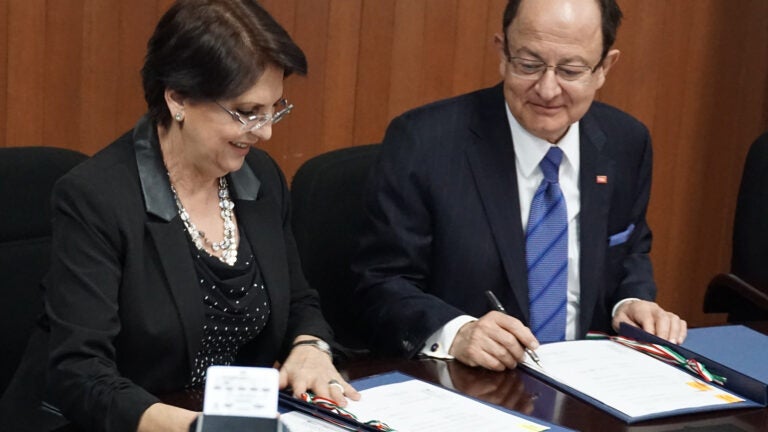
CONACYT’s Maria Dolores Sanchez Soler and USC President C. L. Max Nikias. (USC Photo/Eric Abelev)
USC delegation strengthens partnerships in Mexico
Agreement with science foundation will create 30 postdoctoral fellowships
USC President C. L. Max Nikias is in Mexico City with a delegation of trustees, senior administrators and deans to strengthen partnerships with leading Mexican institutions and foster ties with alumni, parents and prospective students.
The delegation was invited by Mexico’s foreign secretary, José Antonio Meade Kuribreña.
“Over the last four years, USC has nearly quadrupled its Mexican student base, as a result of an enhanced focus on research partnerships, scholarship agreements and student mobility collaborations,” Nikias said.
“Mexico’s position as an integral partner not only for California but for the United States will only grow, and I am confident that USC’s engagement with Mexican institutions will further these emerging opportunities.”
New scholarships
The first major accomplishment of the visit came on March 3, as USC and Consejo Nacional de Ciencia y Tecnología (CONACYT) — the Mexican equivalent of the National Science Foundation — agreed to establish up to 30 postdoctoral fellowships for Mexican scholars to study at USC for up to two years.
The announcement came from Nikias; Maria Dolores Sanchez Soler, CONACYT deputy general director of scholarships; and Julia Tagüeña Parga, CONACYT deputy general director of scientific development.
The jointly funded fellowships will award scholars $68,000 per year. Applications are available on the USC and CONACYT websites.
Today’s announcement deepens our mutual partnership through the creation of a unique set of opportunities for Mexican scholars to advance their research.
C. L. Max Nikias
“I am extremely proud of USC’s longstanding relationship with CONACYT because it serves as a testament to cooperation between our two nations and institutions at the highest academic level,” Nikias said. “Today’s announcement deepens our mutual partnership through the creation of a unique set of opportunities for Mexican scholars to advance their research. We look forward to hosting, working with and learning from these scholars in the years to come.”
In addition, the two institutions agreed to offer five joint scholarships for Mexican students to pursue master’s degrees at the USC Viterbi School of Engineering.
Long-standing relationship
USC has enjoyed a long-standing relationship with CONACYT, with existing agreements in place offering global fellowships for students to pursue doctoral studies at USC in up to 60 Ph.D. programs as well as joint scholarships for students pursuing master’s degrees in public administration, public policy, urban planning and health administration.
In addition to the CONACYT announcement, another agreement was inked between USC Sol Price School of Public Policy and Instituto Tecnológico Autónomo de México to send two undergraduate students to and from each institution for a semester. The partnership represents a first step with further opportunities for staff exchanges, joint research projects and other academic collaborations being explored.
In the days to come, members of the delegation will meet with leaders from industry, government and academia, including a visit to the National Autonomous University of Mexico (UNAM). Founded in 1551, UNAM is the oldest university in North America.
The president and Niki C. Nikias will also host a Trojan Family reception, bringing together alumni, parents, administrators from local high schools and friends for a fun evening that will feature a presentation from Katharine Harrington, vice president of admissions and planning, as well as other updates about the university’s latest developments.
Strong ties
USC boasts a number of strong ties to Mexico through networks of social work and public health research, including a social work program that examines drug abuse epidemiology, treatment and prevention in Mexico City, a research network on aging and health founded by the USC Roybal Institute on Aging and the Mexican National Institute of Geriatrics, and a public policy program related to poverty alleviation in Yucatan.
In addition, multiple student mobility programs have increased opportunities for Mexican students via summer internships, fellowships for Ph.D. and master’s scholarships. Likewise, student mobility opportunities for USC students to study in Mexico have increased to include programs in business, public policy, journalism, and architecture.
As a result of our heightened engagement with Mexico and Mexican institutions, USC’s profile has grown consistently in the last several years.
Anthony Bailey
“As a result of our heightened engagement with Mexico and Mexican institutions, USC’s profile has grown consistently in the last several years, as evidenced by the growth our Mexican student base and the high profile partnerships we have been able to establish,” said Anthony Bailey, vice provost for global initiatives at USC.
“In addition, we recently became a key partner in Mexico’s Proyecta 100,000, which creates a framework under which Mexican students can expand their academic pursuits through post secondary study in the U.S. Since Proyecta 100,000 was launched by Foreign Secretary Meade in May 2014, we have worked closely with the foreign ministry and have hosted over 100 students under the program.”
USC’s office in Mexico City, which opened in 2005, works to foster partnerships, engage alumni and attract prospective students.
